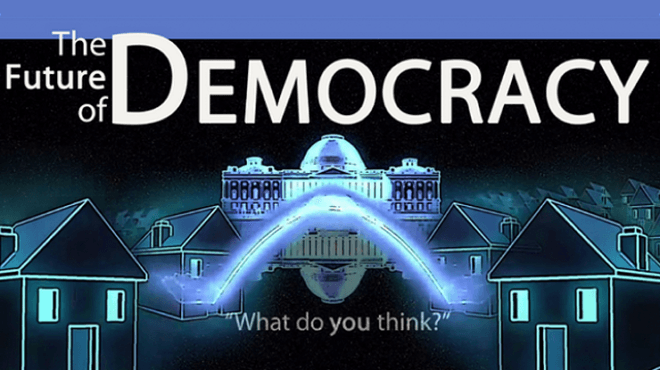Future Democracy: Alternative Models Of Democracy
22nd January 2018 · 6:30pm - 8:30pm
In person | Virtual event

This will be the first meeting in a new series co-hosted by GlobalNet21 and Conway Hall Ethical Society that will look at different models of Future Democracy. It is clear that our existing system of representative democracy falls woefully short of providing good government or adequately representing the will of the people. As a result there has been growing discontent and a lack of trust in both politics and politicians.
But if our existing system is no longer fit for purpose then what is the solution? What alternative is there that can form the basis for a more inclusive democracy and more effective governance?
Here we look at four alternative models of democracy and then open the discussion up to the floor so that we can identify what is wrong with the present system, and also how we can move forward to one that restores faith in the political process.
The models that we will examine and discuss are:
• Wise Democracy is a way to facilitate the people of a large system—e.g. citizens of a community, members of an organization, citizens of a nation—to address and solve difficult issues together. Used at the national level, for instance, it’s an out-of-the-box way to transcend and overcome the usual partisan battle between entrenched positions.
This will be presented by Andy Paice, whose work is to facilitate and catalyse new ways of working and living that are fit for the realities of the 21st century. He coaches people, offers mindfulness (https://www.andypaice.net/mindfulness.html) classes and runs workshops and trainings (https://www.andypaice.net/workshops–training.html). He is a champion of deeper and more participatory forms of democracy (https://www.andypaice.net/projects.html).
• Sortition is the use of random selection to populate assemblies or fill political positions. An assembly that uses sortition would be composed of people just like you and me: it would be a representative random sample of people, making decisions in an informed, fair and deliberative setting.
This will be presented by Peter Cross of the Sortition Foundation. Peter’s interest in and frustration with the poor state of our “democratic” government was awakened when he came across the idea of sortition. He recently joined The Sortition Foundation which aims to promote and to institute sortition as a means of empowering citizens’ assemblies.
• Digital Democracy – With the advent of the Internet can democracy be effectively based on the people’s will and can it replace representative democracy with more direct online citizen involvement? And can it make democracy global where many of the decisions we face cross national boundaries. Using digital tools and methods like hackathons can our democracy change for the better?
This will be presented by Max Kalis, a Senior Strategist at Start, an agency delivering problem solving brand, retail and digital design. He also founded the Influx Trust, a charity for promoting better understanding and engagement between the UN and the public, which delivered a global hackathon series ‘Connect2Effect’ in 9 countries in 2017 to support public engagement with the Sustainable Development Goals (www.connect2effect.com(https://www.connect2effect.com/) ).
• Proportional Representation is the idea that seats in parliament should be allocated so that they are in proportion to the votes cast. Rather than the winner-take all approach of other systems, proportional representation ensures that votes carry equal weight.
This will be presented by Jessica Garland, Director of Policy and Research at the Electoral Reform Societyy. Jess is a former Senior Political Adviser, she has spent six years working in Parliament for Shadow Ministers and MPs. Jess is responsible for policy and research development for the Society. She has a Research Masters in Government, Policy and Politics and was formerly Chair of a youth-led volunteering charity.